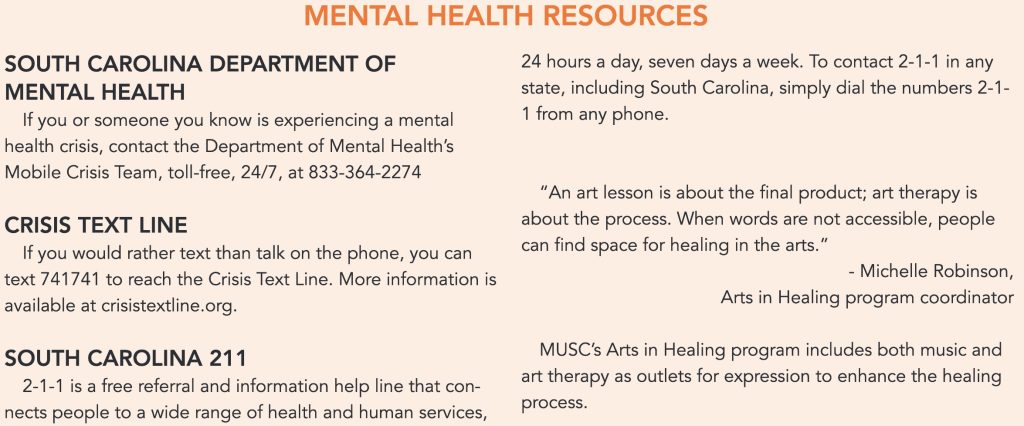When Janelle Mitchell enters the room of one of her adolescent patients who was recently diagnosed with cancer, she doesn’t bring a stethoscope or bandages. Instead, she might be carrying a guitar or the lyrics to the patient’s favorite song. Mitchell is a music therapist at Prisma Health.
“Music therapy is not just playing or performing music. It’s a neurologically based science that can help patients as they learn to cope with a new diagnosis or recent surgery,” Mitchell explained. “We might play or listen to music as a way to help a young patient relax and to help us build rapport. Or a patient might tell us how the lyrics in a favorite song speak to them as we learn about what they are feeling.”
A professional music therapist holds a bachelor’s degree or higher in music therapy with a curriculum focusing on musical foundations, clinical foundations and music therapy principles. Therapists also must be skilled and proficient on several instruments to effectively provide music therapy services. Their training emphasizes that music can act as a medium for processing emotions, trauma and grief or as a regulating or calming agent.
Dr. Frank Clark is a psychiatrist at Prisma Health and a clinical associate professor at the School of Medicine Greenville. He highlights the connection between music and health in his practice and in the community.
“Music allows for better blood flow, and it can help lower stress by decreasing our bodies’ cortisol response, the hormone that is released when we are under stress,” said Dr. Clark. “Music is one part of a holistic approach to medicine. We know that physical, creative, spiritual and emotional fitness work together to improve our quality of life.”
Dr. Clark spearheaded the Healing Harmonies program about 10 years ago at the South Carolina Philharmonic while serving on its board. The program brings South Carolina Philharmonic musicians to area health care facilities for interactive music performances enjoyed by patients, staff and visitors.
Robin Hallyburton, development & deputy director of the South Carolina Philharmonic, has seen moments of joy from the musicians who give of their time and talent, along with audience members.
“Some of the performances are interactive, where the musicians invite audience members to conduct, or they may invite participation by handing out instruments,” Hallyburton explained. “We’re there for staff members, too, giving them a chance to relax and enjoy.”
For Roper St. Francis Healthcare, the connection between music and mental health flowed naturally from its ongoing commitment to recognizing mental health as a community health pillar. Its Music for the Mind initiative celebrates the power of music and its positive impact on mental health. According to Kathy Smith, vice president and chief marketing and digital officer at Roper St. Francis, partnering with community organizations extends the reach of its programs.
“The Roper St. Francis Concert Series at Credit One Stadium allows us to use our trusted voice to give people information about mental health and empower them to give or seek help if needed,” said Smith. “The concerts are an opportunity to build an awareness of what they are feeling, or a neighbor may be feeling, and connect the community to available resources. When people come together at the concerts, there is a joy to the music and the human connection. It can be powerful to reach people when they may not expect to be reached.”
There also is a curated Music for the Mind playlist that people can play on their favorite music app.
“The idea was to draw attention to the program and amplify the music playing even if they can’t attend the concert,” Smith added.
As a music therapist, Alison Hughey founded Carolina Music Therapy in Spartanburg to help people connect and heal through music.
“While music can sometimes be therapeutic on its own, music therapy dives deeper into the use of evidence- and music-based approaches to address individualized clinical goals,” Hughey said.
Hughey likes to add a degree of playfulness to her at-home therapy ideas. She may suggest that clients keep a kazoo in their car – a “carzoo,” as Hughey calls it. That way, whenever the moment strikes, they have a way to explore their feelings through a musical outlet.
“Playing a kazoo encourage players to extend their exhale while also stimulating the vagus nerve; both these actions can boost a sense of safety and calm,” she said.
Dr. Clark knows that music is healthy for our physical and emotional health. “We are rhythmic human beings, and music can be one valuable tool to use when treating patients,” he said. “Why not be creative in fostering health through music?”
By Lisa Wack

